Religion in Eritrea

Religion in Eritrea consists of a number of faiths. The two major religions in Eritrea are Christianity and Islam. However, the number of adherents of each faith is subject to debate. Estimates of the Christian share of the population range from 47% and 63%, while estimates of the Muslim share of the population range from 37% to 52%.[1][2][3]
Most Eritrean Christians belong to the Eritrean Orthodox Tewahedo Church, although a minority is affiliated with the Eritrean Catholic Church and various Protestant denominations, respectively.[3][1] Eritrean Muslims are predominantly Sunni.[3]
Apart from the officially recognized denominations of Christianity and Sunni Islam, all other faiths and denominations are in principle required to undergo a registration process; in practice they are not allowed to register.[4] Among other things, the government's registration system requires religious groups to submit personal information on their membership to be allowed to worship.[4][5][6][7][8]
Faiths and denominations
There are two major religions in Eritrea: Christianity (four denominations) and Islam (only the Sunni school). However, the number of adherents is subject to debate.
- In the 2010 Eritrea Population and Health Survey, conducted by the Eritrean National Statistics Office and the Fafo Institute for Applied International Studies, 61.4% of all survey respondents reported being Christian (56.3% Orthodox, 4.2% Catholic, and 0.8% Protestant), with 38.4% reporting being Muslim, and the remaining 0.2% adhering to traditional faiths. Among women, who made up 87.6% of those surveyed, 60.7% reported being Christian and 39.0% Muslim.[9] In a similar survey of Eritrean women conducted in 2002, 63.0% reported being Christian (57.8% Orthodox, 4.6% Catholic, and 0.7% Protestant), with 36.6% reporting being Muslim.[10]
- In 2015, Pew Research estimated that, by 2020, 62.9% of the population would be Christian, while 36.6% would be Muslim, with the rest following other religions.[5] Pew based its estimate of Eritrea's religious composition on the 2002 survey referenced above.[11]
- The United States Commission on International Religious Freedom's 2021 annual report states that the country's population is "split in half between Christians (49 percent) and Muslims (49 percent)".[6]
- In a 2016 report by Aid to the Church in Need, that organization estimated around 50 percent of Eritrea's population adhered to Islam, and 48 percent followed Christianity, with all remaining religions accounting for two percent.[12]
- According to ACS-Italia estimate, around 52% of Eritrea's population in 2017 adhered to Islam, and 46% followed Christianity, with the remaining 2% of residents practicing other religions, including
- The 2011 edition of the Encyclopedia of Global Religion matches the Pew Research Center estimate of 63% Christian, breaking it down further to: 58% Orthodox; 5% Roman Catholic; and less than 1% Protestant.[8] That report further analyzed the regional distribution within Eritrea:
| Region[8] | Christians | Muslims | Other |
|---|---|---|---|
Maekel Region , ዞባ ማእከል
|
94% | 5% | 1% |
Debub Region , ዞባ ደቡብ
|
89% | 11% | <1% |
| Gash-Barka Region, ዞባ ጋሽ ባርካ | 36% | 63% | 1% |
| Anseba Region, ዞባ ዓንሰባ | 39% | 61% | <1% |
| Northern Red Sea Region, Semienawi Keyih Bahri ዞባ ሰሜናዊ ቀይሕ ባሕሪ |
12% | 87% | <1% |
| Southern Red Sea Region, Debubawi Keyih Bahri ዞባ ደቡባዊ ቀይሕ ባሕሪ |
37% | 62% | <1% |
History of religion in Eritrea
The
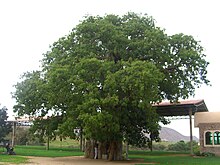
Another great power came in the person of the
Christianity
The various estimates shown above place Christianity (all denominations) as the religion of between 47% and 63% of the population of Eritrea.
Eritrean Orthodox Tewahedo Church

According to surveys, Orthodox Christians make up 56-58% of the population. A large majority of the Christian population of
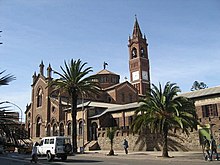
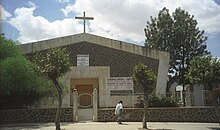
Catholicism
Catholics make up 4-5% of the Eritrean population.
Protestantism
Protestants, sometimes known by the slang name
Islam
The various estimates shown above place Islam as the religion of between 37% and 52% of the population of Eritrea.[17][6][8][1] Whatever the total share of the overall population, a 2009 report finds that over 99% of Eritrean Muslims are Sunnis, with less than 1% Shias.[21]
History
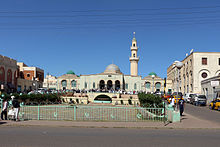
The history of Islam in Eritrea can be traced back to the beginnings of the religion in the 7th century.
Islam later spread in Eritrea under the
Judaism
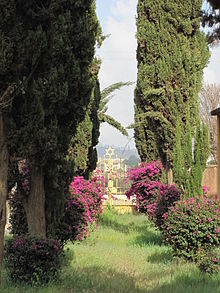
It is believed that before Christianity became the official religion of Abyssinia (ancient Eritrea and northern Ethiopia) in the 4th century, Judaism had a heavy presence in Eritrea. Those who refused to embrace the new religion were compelled to seek refuge in the mountains of southern Ethiopia. This explains the concentration of Jews known as Beta Israel or Falasha in Gondar, Ethiopia and southern Tigray. However, there was not much oppression against ethnic Jews.
The present Eritrean Jewish community is believed to be started by
Religious affiliation by geography and by ethnic group
According to a 2018 report from the United States Department of State, the population in southern and central Eritrea is primarily Christian, while the population of northern Eritrea is primarily Muslim. According to that same report, the Tigrinya ethnic group are primarily Christian, while the Tigre and the Rashaida groups are primarily Muslim.[24]
The majority of Christians are found in the
The majority of Muslims in Eritrea inhabit the eastern, coastal lowlands as well as the western lowlands near the border with
Legal framework and restrictions
The Eritrean constitution provides for the freedom of thought, conscience, and belief; and guarantees the right to practice and manifest any religion. The constitution has not been implemented since its ratification in 1997. Since the constitution has not been implemented, the Proclamation to legally standardize and articulate religious institutions and activities is provided in Proclamation No. 73/1995 of 1995. Although Proclamation No. 73/1995 clearly enshrines the strict principle of secularism, it also states that every Eritrean national's right of freedom of thought, conscience and belief is guaranteed and respected by the law.
However, Proclamation No. 73/1995 also defines that: 1) religious activities are not spread with seduction but with understanding and belief (thus explaining the hostile stance toward new religious movement and evangelical Christian group proselytism); and that 2) religious activities are carried out in accordance with and respects the law of the nation and particularly preserves the peace, stability, and unity of the people and the country.
Moreover, the Proclamation is also clear on the fact that (due to the secular principles) the relation as between the government and religion and religious institutions, as well as policies that deal with religious institutions should be formulated in accordance with the law. Pursuant to this Proclamation there is the establishment of the Department of Religious Affairs within the Ministry of Internal Affairs. This is tasked with regulating religious activities and institutions. The Proclamation emphasizes that religions and religious institutions must not engage in political activities or comment on political issues which would hamper the secular character of the State. The decree additionally prohibits religious groups from initiating or offering social services based on sectarian parameters.
The Proclamation requires religious groups to register with the government or cease activities. Members of religious groups that are unregistered or otherwise not in compliance with the law are subject to penalties under the provisional penal code. The Office of Religious Affairs has authority to regulate religious activities and institutions, including approval of the applications of religious groups seeking official recognition.
Religious groups must renew their registration every year. In 2002, the Roman Catholic Church and the Evangelical Lutheran Church of Eritrea (affiliated with the Lutheran World Federation) were required to submit registration applications and cease religious activities and services until applications were approved.
Treatment of unregistered religious groups
On 25 October 1994, the government revoked the business licenses of
References
- ^ a b c d "National Profiles". www.thearda.com. Retrieved 17 October 2022.
- ^ "Religions in Eritrea | PEW-GRF". Globalreligiousfutures.org. Archived from the original on 7 March 2022. Retrieved 14 March 2022.
- ^ a b c "Eritrea". United States Department of State. Retrieved 5 November 2022.
- ^ a b Fisher, Jonah (17 September 2004). "Religious persecution in Eritrea". BBC News. Retrieved 11 December 2009.
- ^ a b "Religious Composition by Country, 2010-2050". Pew Research Center's Religion & Public Life Project. 2 April 2015. Retrieved 12 October 2021.
- ^ a b c "United States Commission on International Religious Freedom - Annual Report 2021". United States Commission on International Religious Freedom. 2021. Retrieved 28 December 2021.
- ^ a b "Eritrea" (PDF). Archived from the original (PDF) on 12 April 2019. Retrieved 18 August 2018.
- ^ .
- ^ "Eritrea Population and Health Survey 2010" (PDF). UNICEF. August 2013. p. 42. Archived from the original (PDF) on 6 June 2019. Retrieved 30 December 2021.
- ^ "Eritrea Demographic and Health Survey 2002" (PDF). DHS Program. May 2003. p. 32. Retrieved 30 December 2021.
- ^ "THE FUTURE OF WORLD RELIGIONS: POPULATION GROWTH PROJECTIONS, 2010-2050 - Appendix B: Data Sources by Country" (PDF). Pew Research. p. 206. Retrieved 30 December 2021.
- ^ Rapporto Sulla Libertà Religiosa: Eritrea [Report on Religious Freedom: Eritrea] (PDF). Aid to the Church in Need (Report) (in Italian). 2016. Archived (PDF) from the original on 22 October 2020. Retrieved 22 October 2020.
- ISBN 0-7486-0106-6.
- ISBN 1-85065-522-7.
- ISBN 978-1598846546.
- ^ Aksumite Ethiopia. Workmall.com (24 March 2007). Retrieved on 3 March 2012.
- ^ a b c d "Eritrea Religious Demography: Affiliation (web-enabled searchable graphics)". The Future of World Religions: Population Growth Projections, 2010-2050. Pew Research Center. 2015. Archived from the original on 30 October 2021. Retrieved 21 October 2020.
- OCLC 294064246 – via Google Books.
- ^ a b c d 2018 Report on International Religious Freedom: Eritrea. Bureau of Democracy, Human Rights, and Labor (Report). United States Department of State. 2018. Retrieved 22 October 2020.
- ^ Bandini, Franco. Gli italiani in Africa, storia delle guerre coloniali 1882-1943 Chapter: Eritrea
- ^ Miller, Tracy, ed. (October 2009). Mapping the Global Muslim Population: A Report on the Size and Distribution of the World's Muslim Population (PDF) (Report). Pew Research Center. p. 39. Retrieved 30 April 2018.
- ^ ISBN 978-1-59884-231-9.
- ^ Harris, Ed (30 April 2006). "Asmara's last Jew recalls 'good old days'". BBC News. Retrieved 25 May 2007.
- ^ "2018 Report on International Religious Freedom: Eritrea". United States Department of State. Retrieved 21 September 2021.
- ^ "Eritrea". United States Department of State. Retrieved 18 October 2022.
- ^ United Kingdom Home Office’s report paper Fact Finding Mission to Eritrea, pages 7-20. February 2016. Retrieved 17 June 2018.
